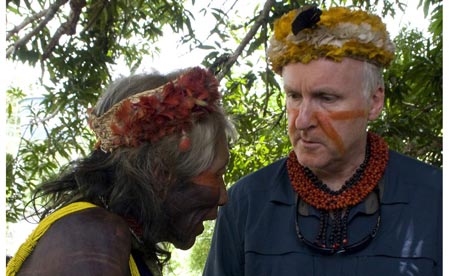By Tom Phillips
"I felt like I was 130 years back in time watching what the Lakota Sioux might have been saying at a point when they were being pushed and they were being killed and they were being asked to displace and they were being given some form of compensation," he said. "This was a driving force for me in the writing of Avatar–I couldn't help but think that if they [the Lakota Sioux] had had a time-window and they could see the future… and they could see their kids committing suicide at the highest suicide rates in the nation… because they were hopeless and they were a dead-end society–which is what is happening now–they would have fought a lot harder."
Ugh. So hear that Natives? We should have just fought harder, and the state of our Native nations would be different. Right.
James Cameron will never get another cent of my money. Sorry SOB. Proud to be Lakota!
I will never see another of his movies. Just don't like him in general. Did not see Avatar.
On the other hand, many people do think Indian reservations are hopeless, dead-end places. So Cameron may have meant what he said.
Nor do I think anyone has ever accused the Lakota of being soft on resistance. Considering they fought on until they were massacred at Wounded Knee, I don't see how anyone could've expected them to do more.
On the other hand, maybe Cameron was seduced by his moviemaking. Maybe he really thinks his Na'vi offer a lesson for indigenous people. Something like, "If you're as smart and brave as my fictional warriors were, you too could win against the forces of imperialism."
Never mind that the Na'vi probably should've lost against the Terran military--even with the help of Jake the white savior. It was a fluke that Jake encountered and was able to tame the giant Toruk, giving him the clout to unite the tribes. That Trudy turned her gunship against Quaritch's ship. And that the Pandoran wildlife joined the battle at just the right moment.
I think it's obvious what Cameron wanted to say: that the traditional Lakota would be unhappy if they saw their people today. I think he chose his words poorly; he stupidly used a phrase that sounded like blaming the victim. But I don't think he meant what people inferred.
For more on the subject, see Brainstorming Avatar 2 with Indians and Dam Suspended with Cameron's Help.
Below: "James Cameron talks to a Xingu leader in Brazil." (Atossa Soldani/EPA)


8 comments:
"I think it's obvious what Cameron wanted to say: that the traditional Lakota would be unhappy if they saw their people today.
That can still be taken as dismissive and insulting to modern Lakota.
Who's to say that pre-1492 Lakota individual looking forward might intead observe that despite the horrific genocide and changes, Lakota people still live proud in 2010?
whike i don't like him in general or seen Avatar , i Thought the terminator serie were amazing !
i can only make sense of this , as circumstencial coincidence.
Come to think of it, this statement is reminding me of Piers Ahthony's dismissal of modern Natives as a pathetic remnant not worth considering.
Very interesting to know that the director of 'Titanic' (haha) was around 130 years back in time to witness Lakota resistance and now, in 2010, he is able to gauge just how hard they fought and how much "harder" they should have tried.
(LOL @ Lakota 'Sioux', though.)
M: With Sioux still found in the official names of Lakota/Dakota/Nakota tribes and other organizations, it would appear that this word is acceptible.
Though it's clear to everyone know who the Lakota are. Adding "Sioux" at the end is redundant. Sort of like saying "Polish Slavic" instead of just "Polish".
dmarks:
Oh, that was my point - the redundancy. While what you write about the term 'Sioux' is true, it is also considered offensive to many Lakota people. Anyway, I just prefer to call all ethnic groups by their real name or, when dealing with individuals, by what they prefer. Plus 'Lakota' is always a safe bet.
I agree that people might find my interpretation of Cameron's comments "dismissive and insulting to modern Lakota." But it would be less obviously offensive, I think. And Cameron could ameliorate the offense further by saying, "The traditional Lakota would be unhappy if they saw how some of their people are suffering today."
P.S. "Sioux" refers to the Dakota and Nakota as well as the Lakota people, so "Lakota Sioux" isn't quite redundant.
Post a Comment